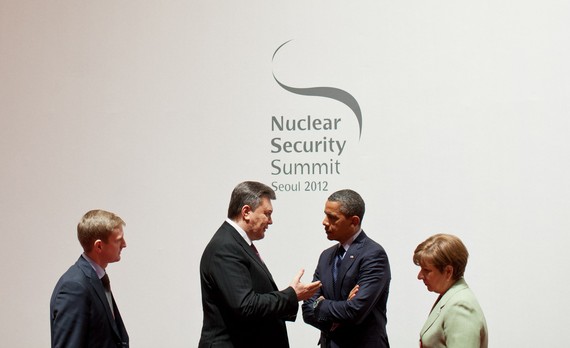Image: Viktor Yanukovych. Public Domain
If an American PR whiz had not helped Yanukovych, would Ukraine still be intact?
A British scholar wrote an eye-opening book a decade ago on the tactics that candidates in the former Soviet Union used to win elections.
Andrew Wilson's "Virtual Politics" became an instant classic in the fields of political science and Russian studies.
His premise was that election-campaign managers in the former Soviet Union used an array of tricks far vaster and dirtier than campaign managers in the West to assure client victories.
A key difference between a campaign manager in the former Soviet Union and the West, he said, was that an easterner had no problem breaking the law to win -- anything to achieve victory.
Vladimir Putin's stooge, Viktor Yanukovych, used many of the dirty and illegal tricks listed in "Virtual Politics" in Ukraine's 2004 presidential election, but lost.
In what I consider a delicious irony, Yanukovych then used American rather than former Soviet campaign tactics to win the presidency in 2010.
The man who gave him the tactics was Paul Manafort, who became Donald Trump's campaign manager this year but fizzled spectacularly when questions arose about Manafort's ties with Ukraine and Russia.
I was thinking about Manafort's work for Yanukovych the other day, and couldn't help but wonder: If the American hired gun had not helped Yanukovych, would Ukraine still be intact, without the loss of Crimea and without a devastating war in the east?
I'll return to that thought, but first let me discuss just a few of the dozens of dirty tricks for winning elections that Wilson listed in "Virtual Politics" -- because they're so much fun to talk about.
One is to create virtual politicians whose role is only to dilute your opponent's vote.
Let's say you have 45 percent of the vote in pre-election polls for the presidency, but you have a strong opponent with 40 percent. That's too close for comfort.
And let's say you are a conservative and your opponent a liberal.
Your campaign manager finds two people who could pose as liberal politicians, and you secretly put them on your payroll. The two new candidates offer the very same platforms as your main opponent, which means they take votes from that opponent.
In the end, the 40 percent of the vote that your main opponent once had is split among the three liberal candidates, with each having about 13 percent of the vote.
Diluting your main opponent's vote lets you win the election with ease.
Another way to dilute your main opponent's vote is to pay people with the same name as your opponent to run against him. Let's say your opponent is Igor V. Ivanov. You convince guys named Igor D. Ivanov and Igor S. Ivanov to run, too.
When voters who favor your main opponent enter the voting booth, they see three Igor Ivanov's on the ballot. Confused, many vote for the wrong one -- which is exactly what you want.
Using virtual politicians and same-name candidates to dilute your opponent's vote are dirty, but not illegal. But many campaign tactics in the former Soviet Union are flat-out illegal.
One that Yanukovych used was hiring the same groups of people to take trains or buses on election day to polling places across the country. These mobs, often drinking during their trips, voted every time the trains or buses stopped -- clearly breaking the law.
I won't go in to the other illegal tactics Yanukovych used because it would take up too much space. The bottom line is he got caught stealing the election, a court threw out the results, and Viktor Yushchenko won the new election that the court ordered.
Since his Ukrainian campaign managers had failed, in the 2010 election Yanukovych turned to Manafort, who employed American-style image-makeover tactics.
Many Ukrainians viewed the twice-imprisoned Yanukovych -- rightfully -- as a poorly educated, crude-talking thug.
Manafort portrayed him as a poor waif who had overcome a difficult childhood as an orphan to make something of himself. This prompted many of those who had once looked down on Yanukovych to feel more sympathetic toward him.
Manafort also worked on Yanukovych's image by putting him in expensive clothes, changing his gangster-looking hairstyle, having tutors work with him on his poor grammar, and convincing him not to lash out at political opponents in threatening, gangsterish ways.
In the end, Manafort's image-polishing worked where Ukrainian "Virtual Politics" tactics had failed.
Maybe the leaders of other former Soviet countries ought to take a page from Yanukovych's book by hiring Western campaign managers. One candidate for a Western handler might be Serzh Sargsyan, president of Armenia, where the opposition has become more strident due to entrenched corruption and other problems.
The problem in Ukraine was that voters elected to the presidency a guy who looked less like a gangster but still was one, and who stole billions from the taxpayers before being thrown out in 2014.
Putin, incensed at Yanukovych's ouster, retaliated by seizing Crimea. Eastern Ukrainians, angry that non-easterners had ousted a president from their area, began a rebellion that is still tearing the country apart.
I have to wonder: If Manafort hadn't come along to pull the wool over Ukrainians' eyes, and help Yanukovych defeat Yuliya Tymoshenko for the presidency, would Ukraine still have Crimea and peace in the east?
My answer is: There's a good chance it would still be stable.
To me, the supreme irony in what happened in Ukraine is that one hired-gun American was able in a very short period to undo years of U.S. government work to help Ukraine become a viable, independent state.
Armine Sahakyan is a human rights activist based in Armenia. A columnist with the Kyiv Post and a blogger with The Huffington Post, she writes on human rights and democracy in Russia and the former Soviet Union.

